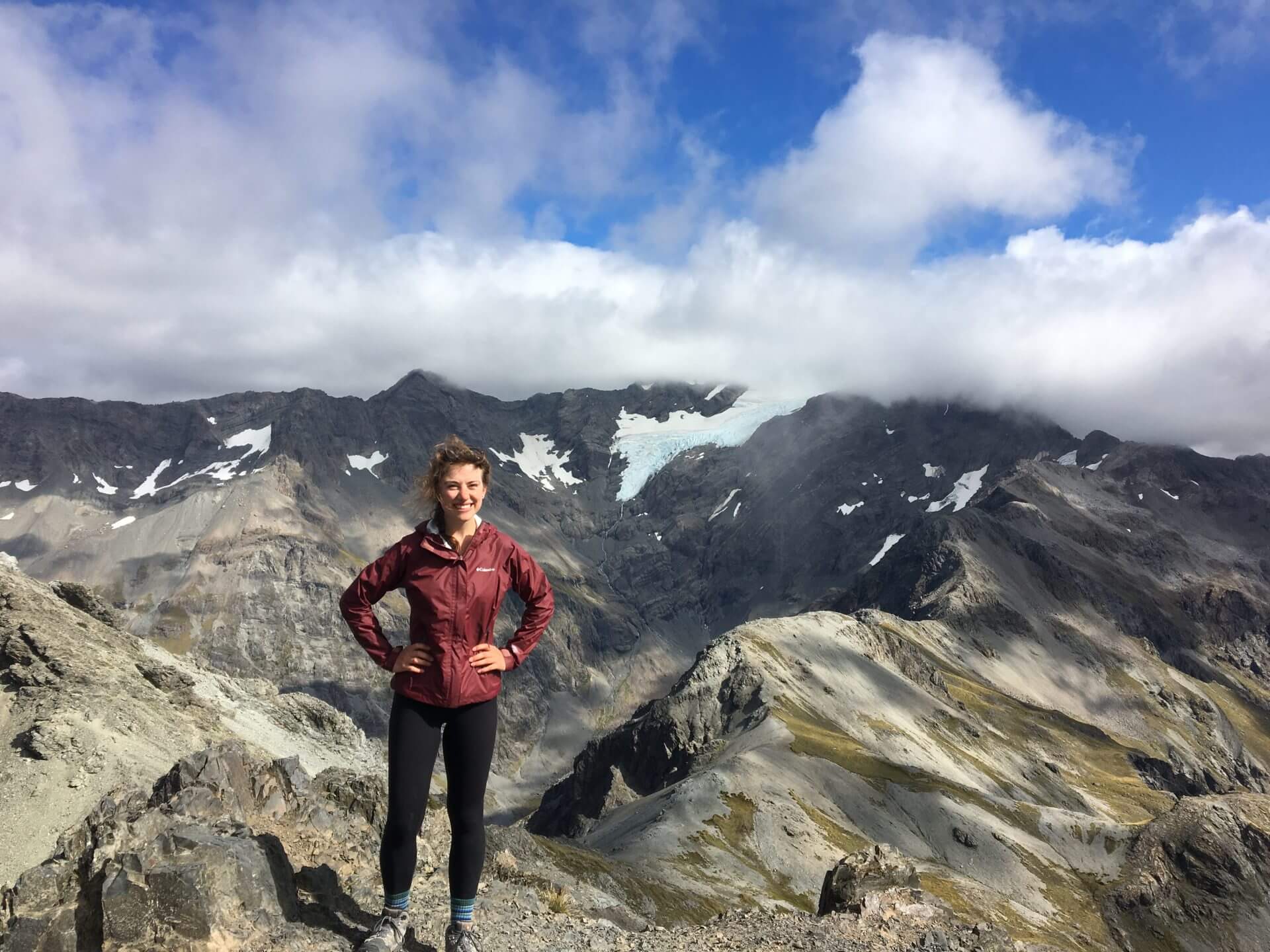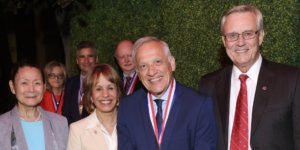
Senior Soraya Levy graduates as a Grand Challenges Scholar and recipient of the Student of The Year Award from the Daniel J. Epstein Department of Industrial and Systems Engineering. Photo courtesy of Soraya Levy
Soraya Levy isn’t afraid to get her hands dirty.
Last year, the graduating senior from USC Viterbi’s Daniel J. Epstein Department of Industrial and Systems Engineering spent part of her semester living and working on an organic saffron and cattle farm in New Zealand.
Before you imagine a scene out of “The Sound of Music” with idyllic frolicking through the fields and singing kumbaya around the campfire, her duties included extracting honey from 100 beehives, installing barbed-wire fencing and shifting a herd of about 1,000 cattle to new paddocks.
“It was one of the best engineering experiences I had,” said Levy who is a USC Renaissance Scholar and Presidential Scholar, also graduating with a minor in in visual culture. “It combined all my interests in environmental sustainability, social analysis, and systems thinking.”
In between dirt, sweat and frustration she formed a deeper understanding of the soil, climate, biodiversity, animals and markets than she ever could in a classroom. She also witnessed the fast-growing movement of regenerative agriculture in New Zealand where farming is the country’s largest industry. New Zealand, which is about 1.5 times smaller than California, is also the world’s eighth largest milk producer.
“The coronavirus pandemic is really encouraging people to think more about where their food comes from,” she said. “Even in New Zealand, a country I’d previously regarded as a place that sat at the pinnacle of sustainable food production, there seemed to be a large disconnect between farmers, policy makers and end consumers. A top-down, policy-oriented, approach toward greening the country’s food system seemed to be threatening the economic wellbeing of farms and, consequently, the affordability of fresh, healthy produce for all New Zealand residents.”
Levy advocates for a deeper engagement with — and partnership between — farms, governments, and consumers. This, she believes, will become “the crux of ensuring a sustainable food supply for everyone on the planet.”
She saw the same disconnect between consumers and the clothes we wear. In response, she co-founded Bloom Boutique at USC, a non-profit start-up that promotes sustainable fashion by collecting and redistributing trendy clothes donated by the USC community. Their mission is “to end the environmental and human toll of fast fashion.”
Fast fashion is a term used to describe the modern fashion industry marked by high volume of production and low margin, fast-paced, cheap and disposable items. According to the United Nations, it contributes to ten percent of global greenhouse emissions not to mention the working conditions of textile factory workers and the fact that 85% of the garments they make end up in landfills.
Consider that 10,000 liters of water is required to grow just the one kilo of cotton needed for one pair of jeans. It would take a human being about 10 years to drink 10,000 liters of water. Through Bloom Boutique, Levy created an alternative to donating those jeans to another student or a person in need in the USC neighborhood.
“We started with four students, educating the USC community about the fast fashion industry,” she said. “We keep prices low and donate 100% of our profits to local charitable organizations because we know that fashion has the power to strengthen communities.”

Soraya Levy (second from right) co-founded Bloom Boutique at USC to reduce waste produced by the fast fashion industry. Photo Courtesy of Soraya Levy
Strengthening communities is perhaps the best way to describe Levy’s mission at USC. As the vice president of programming for USC’s student chapter of the Institute of Industrial and Systems Engineers (IISE), she also planned recruitment and informational events with Amazon, Boeing and Disney opening doors for her fellow Trojans. Together with IISE’s president, Tyler Somlo, she developed a partnership with engineering consulting firm Moffatt and Nichol that allows students to analyze data from the port of Los Angeles to increase efficiency of shipping operations.
This month, she opens a door for herself as a brand planner for General Mills’ Natural and Organics Operating Unit in Berkeley, close to her Monterey home and her parents, both public school teachers.
“My parents have always encouraged me to explore my curiosities, whether fashion or engineering and I think that encouragement is a result of their personal drive to explore the many facets of education,” said Levy whose love of engineering first sparked when she was the robotics team captain at her high school. “I am grateful for the example they’ve set for me – exploring their varied interests and really exhibiting tremendous motivation to do so.”
Levy further credits Professor Najmedin Meshkati’s ISE 370 Human Factors course in influencing her to pursue Global Grand Challenges.
“Soraya is the quintessential renaissance scholar and an embodiment of our Engineering+ philosophy. She is truly a global engineer,” said Meshkati, a professor of civil and environmental engineering, industrial systems engineering and international relations. “Hesitant to shoehorn herself into one specific field of study, she’s always seeking to bolster the important ties between technological system, social, and spatial analysis while working to address the large, looming sustainable development challenges of her generation.”
Her ISE 370 term paper, which led to her collaboration with biomedical engineering student Dea Kurti, from Meshkati’s Engineering Diplomacy course, formed the basis for their research proposal “A System of Systems Approach to Bring the UN Sustainable Development Goals on Track: Focusing on the Cross-Cutting and Enabling Key Goal # 17 (Partnerships for the Goals)”, received funding from the USC Undergraduate Research Associates Program.
As she graduates, Levy will add two more feathers in her cap. She will graduate with the distinction of Exemplary National Academy of Engineering Grand Challenges Scholar and the Daniel J. Epstein Department of Industrial and Systems Engineering Award for Student of The Year.
“What I take away with me is how interdisciplinary and not siloed any one of our global challenges are,” she said. “I hope that all of us graduating this year remain flexible and versatile because the world is not predictable and because new situations that stray from the plan often open up new opportunities.”
Published on May 14th, 2020
Last updated on July 14th, 2022












